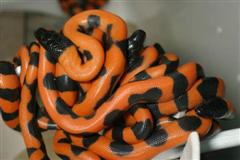Python - Ringed
Bismarck Ringed Python Scientific Name: Liasis boa
Sun, 24th November, 2024 - 9:15 am GMT
Sponsor Ads:

Alternative Name
Bismarck Ringed Python Scientific Name: Liasis boaBasic Info
Rarely exceeding six feet in length, the Ringed Python is a moderately sized creature. They generally average between four and five feet. The pattern on the Ringed Python's body varies greatly within the species. The hatchling Ringed Python are amazing in coloration. They are generally very bright, almost fluorescent orange with black bands. The background color fades to brown or orange-brown as the animals matures.
Health
The Ringed Python requires a large enclosure. They should be provided with a tall area with plenty of branches for climbing. Because they will climb and are very adept at escaping, the enclosure should be escape-proof. The humidity within the enclosure should remain around 80% at all times, although it is very important that the enclosure is not wet. The ambient temperature within the enclosure should be about 80 degrees Fahrenheit with a warmer basking area in the high 80s. Juvenile Ringed Pythons often require small lizards. Breeding The female Ringed Python can be bred when she reaches about four feet in length. To get the snakes ready to breed, the temperature should be decreased to the high 60s at night. After about a month, the male and female snakes should be placed together. Several weeks after introduction, the temperature should be increased back to normal. About sixty days after breeding, the female will lay a clutch of between five and ten eggs. Larger females may have even more eggs in their clutch. They usually hatch after between 56 and 65 days of incubation at around 90 degrees Fahrenheit.Habitat
Usually be found in grassy and forested regionsBehavior
The Ringed Python is a moderately sized Python, usually found in New Guinea. They are quite beautiful! The terrestrial Ringed Python is a nocturnal animal that can usually be found in grassy and forested regions. Many Ringed Pythons are quite aggressive with a very active feeding response. They should only be kept by experienced snake-keepers. Ringed Pythons require a great deal of handling to become docile and they will often bite in self-defense. Once considered only a snake for the wealthy Python aficionado, Ringed Pythons are gradually becoming more readily available and more affordable to the budget-minded snake-lover. They are easy to breed in captivity, although because of their aggressive natures, they should not be kept by beginners.Origin
New GuineaHistory
The Ringed Python can be found in northeastern Papua-New Guinea and the Bismarck Archipelago.Common Foods
They feed primarily on small animals such as lizards and small mammals.Sponsor Ads:
Everything comes to he who waits - providing he has either infinite patience or infinite wealth. -- Unknown
Python - Ringed
Coded by: BGID® | ALL RIGHTS RESERVED Copyright © 2000-2024
Disclaimer | Privacy | Report Errors / Contact | Credits


 Politician, US Vice President and President of the USA - Joseph Robinette Biden Jr.
Politician, US Vice President and President of the USA - Joseph Robinette Biden Jr.  President of the United States of America - Real Estate mogul, Pageant owner and now one of the most controversial men in political history.
President of the United States of America - Real Estate mogul, Pageant owner and now one of the most controversial men in political history.  versus
versus  Russia: 'The Evil Empire'? Are they all that bad or is it just the USA trying to portray Russia as bad because they are a world power with land bigger and a society very different from the USA ideal?
Russia: 'The Evil Empire'? Are they all that bad or is it just the USA trying to portray Russia as bad because they are a world power with land bigger and a society very different from the USA ideal?  Global warming has been in and out as the "latest" hot topic for many years. It is, according to modern scientists, the result of man-made industrial pollutants, clearing forested areas, agriculture, etc. But now they are thinking it started way before the Industrial Revolution...
Global warming has been in and out as the "latest" hot topic for many years. It is, according to modern scientists, the result of man-made industrial pollutants, clearing forested areas, agriculture, etc. But now they are thinking it started way before the Industrial Revolution... 
 Corona virus
Corona virus 
 Users with wide screen monitors can benefit from more content on every page.
Users with wide screen monitors can benefit from more content on every page.